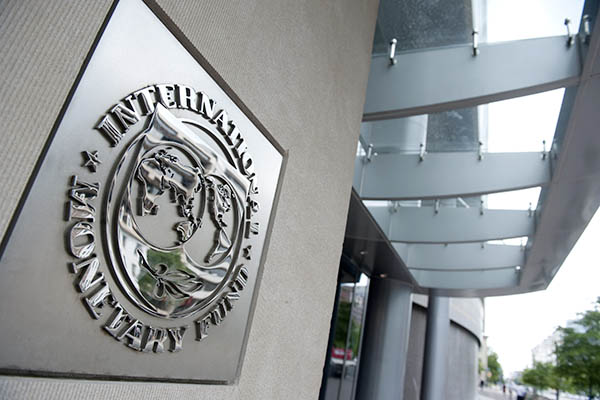
Saul Loeb—AFP
In statement, global lender says deal subject to approval by Executive Board following the implementation of ‘prior actions’
The International Monetary Fund (IMF) and Pakistan have reached a staff-level agreement on policies and reforms needed to complete the sixth review under the $6 billion Extended Fund Facility (EFF), which has been suspended since April, the global lender announced on Monday.
“The agreement is subject to approval by the Executive Board, following the implementation of prior actions, notably on fiscal and institutional reforms,” read the statement, adding that once it has been completed $1,059 million in special drawing rights (SDR) would be made available to Pakistan, bringing total disbursements under the EFF to $3,027 million.
Acknowledging a “difficult environment,” the IMF praised Pakistan’s progress in implementing its EFF-supported program. “All quantitative performance criteria for end-June were met with wide margins, except for that on the primary budget deficit. Notable achievements on the structural front include the finalization of the National Socio-Economic Registry update, parliamentary adoption of the National Electric Power Regulatory Authority (NEPRA) Act amendments, notification of all pending quarterly power tariff adjustments, and payment of the first tranche of outstanding arrears to independent power producers to unlock lower capacity payments fixed in renegotiated power purchase agreements,” it said, adding that progress to curb terror financing and combat money laundering had also been noted.
“Available data suggests that a strong economic recovery has gained hold, benefiting from the authorities’ multifaceted policy response to the COVID-19 pandemic that has helped contain its human and macroeconomic ramifications,” said the global lender, praising the Federal Board of Revenue (FBR)’s tax revenue collection. However, it added, “external pressures” had increased the current account deficit and caused rupee depreciation due to “stronger economic activity, an expansionary macroeconomic policy mix, and higher international commodity prices.”
The IMF said that in a bid to counter such pressures, the government had started to gradually ease coronavirus-related stimulus measures. “The State Bank of Pakistan has also taken the right steps by starting to reverse the accommodative monetary policy stance, strengthening some macroprudential measures to contain consumer credit growth, and providing forward guidance,” it said, adding that government was also planning to introduce fiscal measures to reduce the primary deficit.
The government’s policies, it said, would help safeguard the positive near-term outlook and allow Pakistan’s economic growth to achieve or exceed 4 percent in the current fiscal year and 4.5% in FY23. It said that while inflation remained high, it should “start to see a declining trend once the pass-through of rupee depreciation is absorbed, and temporary supply-side constraints and demand-side pressures dissipate.”
Regardless, said the IMF, the current account deficit was expected to widen in the current fiscal.
Staff-level talks
Discussions between the IMF and government officials, read the statement, focused on policies to help Pakistan achieve sustainable and resilient growth. “On the fiscal policy front, staying on course on achieving small primary surpluses remains critical to reduce high public debt and fiscal vulnerabilities. Continued efforts to broaden the tax base by removing remaining preferential tax treatments and exemptions will help generate much-needed resources to scale up critical social and development spending,” it said.
The IMF said that Pakistan’s monetary policy needed to remain focused on curbing inflation, preserving exchange rate flexibility, and strengthening international reserves. “As economic stability becomes entrenched and the independence of the SBP is strengthened with the approval of the SBP Act Amendments, the central bank should gradually advance the preparatory work to formally adopt an inflation targeting regime in the medium term, underpinned by a forward-looking and interest-rate-focused operational framework,” it said, adding that reforms in the electricity sector were vital to make it financially viable and counter its adverse impact on the budget, financial sector and real economy.
“In this regard, steadfast implementation of the Circular Debt Management Plan will help guide the planned management improvements, cost reductions, timely alignment of tariffs with cost recovery levels, and better targeting of subsidies to the most vulnerable,” it said.
In the medium-term outlook, said the global lender, Pakistan needed to increase focus on strengthening economic productivity, investment and private sector development, including improving the governance, transparency, and efficiency of the state-owned enterprise sector, fostering the business environment, governance, and the control of corruption, boosting competitiveness and exports, promoting financial deepening and inclusion and addressing challenges posed by climate change.
In a post on Twitter, Finance Ministry spokesman Muzzammil Aslam said the agreement had been achieved after 45 days of talks between the IMF and the government. Last week, Adviser to the P.M. on Finance Shaukat Tarin had admitted that Pakistan needed to achieve five “prior actions” to resume the loan program: legislating the State Bank of Pakistan (Amendment) Bill; withdrawing tax exemptions; increasing the energy tariff; increase to the monetary policy; and adjustment to the exchange rate.
